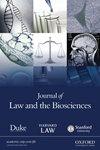The right to mental integrity in the age of neurotechnology: constructing scope and exploring permissible limitations.
IF 2.4
2区 哲学
Q1 ETHICS
Journal of Law and the Biosciences
Pub Date : 2025-06-03
eCollection Date: 2025-01-01
DOI:10.1093/jlb/lsaf010
引用次数: 0
Abstract
One way to ensure adequate legal protection against existing and emerging forms of mental interference is by specifying the human right to mental integrity. This paper considers three possible constructions of the scope of this right in human rights law. It argues that the Mental Control View and the Direct Harmful Interference View fall short of providing a persuasive definition of the right. Rather, it is proposed to construct the scope of the right along the lines of the Significant Mental Interference View. Meanwhile, the directness of a mental interference and the psychological harm it entails are plausibly relevant factors to the potential justification of rights infringements.
神经技术时代的精神完整权:构建范围和探索允许的限制。
确保对现有和新出现的精神干预形式提供充分法律保护的一种方法是具体规定享有精神健全的人权。本文考虑了人权法中对这一权利范围的三种可能构建。它认为,精神控制观和直接有害干涉观未能提供一个有说服力的权利定义。相反,建议沿着显著性心理干扰观的思路来构建权利的范围。同时,精神干扰的直接性及其所带来的心理伤害是构成侵权正当性的合理因素。
本文章由计算机程序翻译,如有差异,请以英文原文为准。
求助全文
约1分钟内获得全文
求助全文
来源期刊

Journal of Law and the Biosciences
Medicine-Medicine (miscellaneous)
CiteScore
7.40
自引率
5.90%
发文量
35
审稿时长
13 weeks
期刊介绍:
The Journal of Law and the Biosciences (JLB) is the first fully Open Access peer-reviewed legal journal focused on the advances at the intersection of law and the biosciences. A co-venture between Duke University, Harvard University Law School, and Stanford University, and published by Oxford University Press, this open access, online, and interdisciplinary academic journal publishes cutting-edge scholarship in this important new field. The Journal contains original and response articles, essays, and commentaries on a wide range of topics, including bioethics, neuroethics, genetics, reproductive technologies, stem cells, enhancement, patent law, and food and drug regulation. JLB is published as one volume with three issues per year with new articles posted online on an ongoing basis.
 求助内容:
求助内容: 应助结果提醒方式:
应助结果提醒方式:


